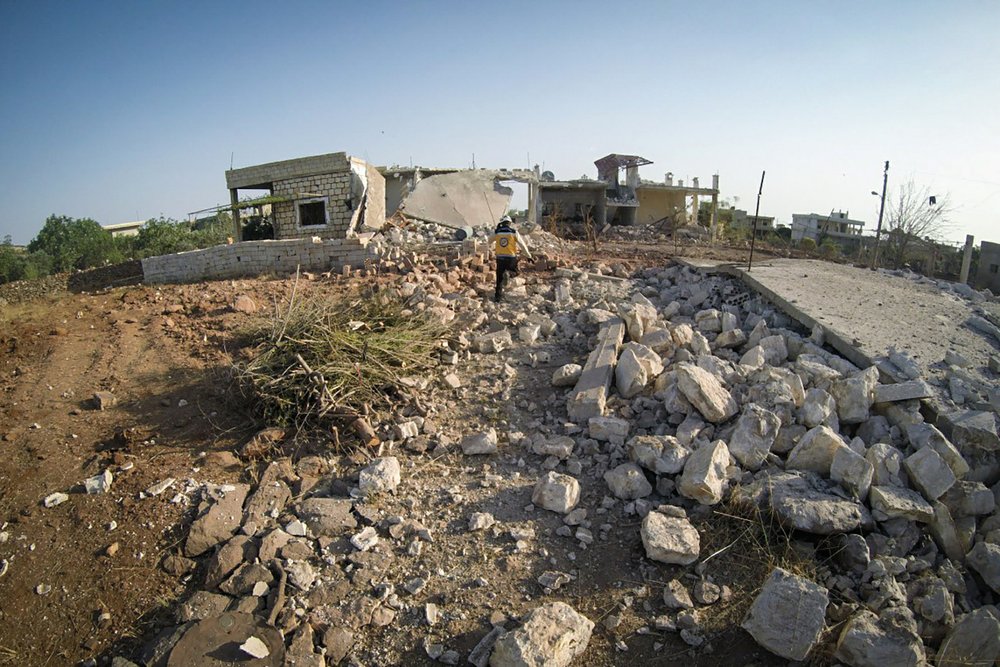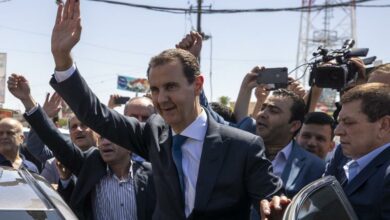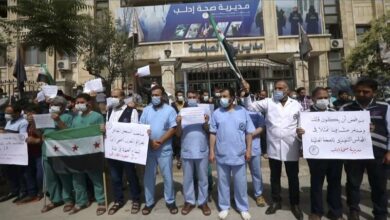Damascus — In the most significant act of defiance in decades against the Ba’athist regime that has ruled Syria for nearly 50 years, thousands took to the streets in the southern city of Deraa after Friday prayers on 18 March chanting “God, Syria and freedom — that’s enough!”
The demonstration marks the most visible sign that the revolutions and uprisings sweeping the Arab World have finally arrived in Syria. But the response of the regime was swift. Security forces fired into the crowds, killing at least three protesters and injuring hundreds, witnesses said.
The mood at the funerals for two of the victims the following day was vitriolic. “The blood of our martyrs won’t be forgotten!” shouted thousands more mourners, who began openly calling for revolution. Security responded with tear gas and baton assaults.
Though small by Egyptian and Tunisian standards, Syrian activists say the unrest shows discontent is swelling.
“This is not just in Damascus; this is all over, in Homs, Aleppo, Deraa, everywhere,” says Ayman Abdul Nour, a Syrian dissident and editor of the All4Syria website, which operates from Dubai.
“The numbers don’t reflect the significance of these events and the anger in the people. It will start small, just as it did in Egypt, but it’s going to get bigger.”
Not everyone is so confident. Amid the uprisings in the Arab World, the autocratic regime of Syrian president Bashar al-Assad has largely looked remarkably resilient.
“Syria is stable,” al-Assad told the Wall Street Journal at the end of January, after Tunisia’s president Ben Ali fell and the height of the pro-democracy demonstrations in Egypt were underway.
“We are outside of this; we are not Tunisians and we are not Egyptians.”
Indeed, he may be right. Fear of the regime and its ubiquitous security men has so far warded off widespread dissent, and Syrians’ appetite for a full-scale overthrow of the government is questionable.
The protests leading up to Friday’s events in Deraa were small. Gatherings of a few hundred people were reported in other cities including Homs and Banyasin the west, as well as a string of demonstrations in the capital Damascus.
On 16 March, a group of around 150 protestors were beaten by mukhabarat –plain-clothed security — and at least 30 arrested when they called for the release of political prisoners outside the interior ministry in the center of the capital.
Protesters were mainly human rights activists and families of political prisoners who languish in Syria’s jails in the thousands. The protest was planned by the Syrian Human Rights Observatory. But who is behind other recent protests is less clear.
A day earlier, a group of around 40 men appeared at the nearby Hamidiyeh souk — and area popular with tourists — to chant “God, Syria, freedom!” before disappearing.
Syria’s small band of dissidents and activists — badly organized and disparate — did not appear to be involved. The group appeared to be responding to a call for protests from a Facebook group titled ‘The Syrian Revolution 2011”, which had amassed more than 40,000 fans by the end of last week. It is calling for nation-wide protests against political repression and corruption.
And the protests have persisted. Since Friday, Deraa has hosted daily demonstrations and protesters continue to take to the streets in Damascus despite the harsh methods of suppression.
Syrians may have broken their silence, but how far the demonstrations will go is still unclear.
Fears of the regime and its pervasive leather-jacket-clad mukhabarat are still helping to quell any revolutionary aspirations.
Brutality was used to break up the latest protests, but Syrians have long lived with a constant fear that they are being monitored, and will be punished for behavior regarded as dissenting or unpatriotic. Public discussion of domestic politics remains taboo, and telephone conversations that stray onto “sensitive” subjects are immediately cut short, for fear that the mukhabarat are listening in.
Maintaining that fear is helped by a heavily censored media and 50-year-old emergency laws that allow activists and dissidents to be routinely rounded up and imprisoned on vague charges such as “weakening national sentiment.”
“People are scared,” says Aref, a 27-year-old economics student sitting in a quiet café in central Damascus. He asked that his real name not be used in case the authorities discovered he had been talking to the press.
“I have never felt repression or stress like it. I know that if I say something ‘wrong’ I risk being put in jail. If I walk down the street with a foreigner, the mukhabarat immediately come up to me and want to know what I’ve been saying.”
Things have become worse in recent weeks, he adds, because people have begun overtly calling for political change for the first time.
Human rights activists agree. Those known to the authorities report visits from Mukhabarat to admonish protest participation.
Despite the recent decision to allow access to sites such as Facebook and YouTube for the first time, the internet remains restricted. Blogs and dissident sites are still blocked and usage is still monitored.
Marwan Darwish, a prominent free speech activist, says that when security services arrested him at the Interior Ministry protest last week, the first thing they asked for was the password for his Facebook account.
Dissident Abdul Nour says such repressive measures can only last so long. “There are cracks in the wall of fear,’ he said “It hasn’t fallen yet, but it will.”
Even if Syrians overcome their fears, however, it is not certain that they would call for a full-scale revolution and the overthrow of Assad.
So far the chanting at protests has fallen short of urging the ouster of the president — the central demand of protesters in Cairo and Tunis.
After just 11 years in charge, Assad is a new dictator by regional standards. When he inherited the presidency at the age of 34 following the death of his father Hafez in 2000, he promised political and economic reforms.
These have yet to materialize, but many young Syrians still want to give him a chance.
“Everyone sees that the country has changed since 2000,” says Muhammad, a photographer in his 30s. “Things are changing and it looks like they are changing for the better, so why would I want to go out on the streets?”
He agrees greater political freedoms are needed, but questions whether protesting against a reform-minded president is the best way to get them.
Syrian dissidents argue that this attitude is naïve. Assad has had plenty of time to enact reform says Najib Ghadbian, an active Syrian dissident living in the US and a signatory of 2005’s ‘Damascus Declaration’ calling for political reform.
“Assad acknowledges the need for reform, but where is it?” says Ghadbian. “The Ba’ath party still enjoys a total monopoly of power, there are no real opposition parties or free elections, and emergency laws are still in place even though we all know there is not security threat to the government any more.”
Ghadbian argues, in light of the recent unrest in the Arab World, now is the optimal time to finally enact those reforms.
Ayman Abdul Nour agrees: “If [Assad] seizes the moment and he will be the first Arab leader to bring his people into the 21st century with a democratic country.”
But even if political reform is sped up and suppression toned down, plenty of potential grievances remain to spark future unrest.
The most remarkable demonstration in recent weeks saw crowds of hundreds spontaneously gather in Damascus’s Old City when a shopkeeper’s son was allegedly insulted and beaten by a traffic policeman. “The Syrian people will not be humiliated,” they chanted.
Furthermore, Syria is not immune to the economic woes that have played a significant part in unrest elsewhere.
Despite the introduction of some free market measures, its economy is fragile. Officially unemployment stands at around 10 percent, but most independent economists believe the figure is closer to 25 percent.
Poverty rates too are high. The UN warns that between 2 and 3 million people are now in extreme poverty — a situation exacerbated by a four-year drought in the north-east of the country. People often complain about rising food and fuel prices.
The government clearly recognizes these dangers and is nervous. It recently announced measures aimed at easing food price inflation and cutting fuel costs, as well as planned increases to salaries.
In a move that some see as comic, Syria's interior minister announced a plan last week to create 20,000 new jobs — by significantly expanding the size of the police force.
And corruption is an everyday feature of dealing with government officials for most Syrians. The regime says it recognizes the problem, and by projecting an image of a modest lifestyle compared to the Mubaraks and the Qadhafis, the Assad family has avoided accusations that it is profiting from its power — but corruption remains detested.
Whether these grievances will be enough to fuel the current protests remains to be seen. Analysts admit they simply don’t know what will happen next.
“I don’t think the regime is going to fall any time soon, but then again no one knows what’s going to happen anymore,” admits Joshua Landis, a long-time Syria watcher and director of the Centre for Middle East studies at Oklahoma University in the US.
“We thought the Arab regimes were stable until this year, and we were proved wrong.”




